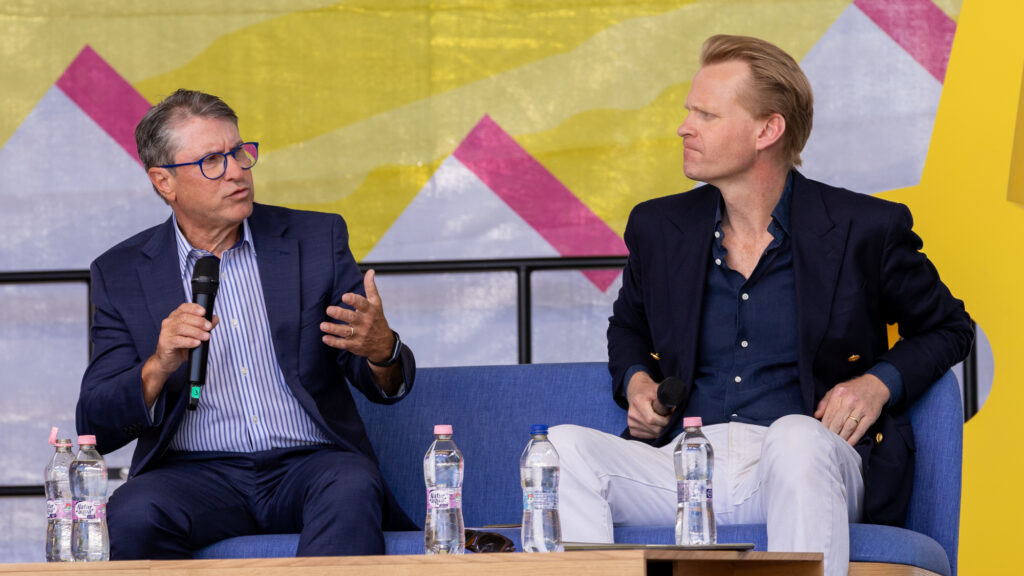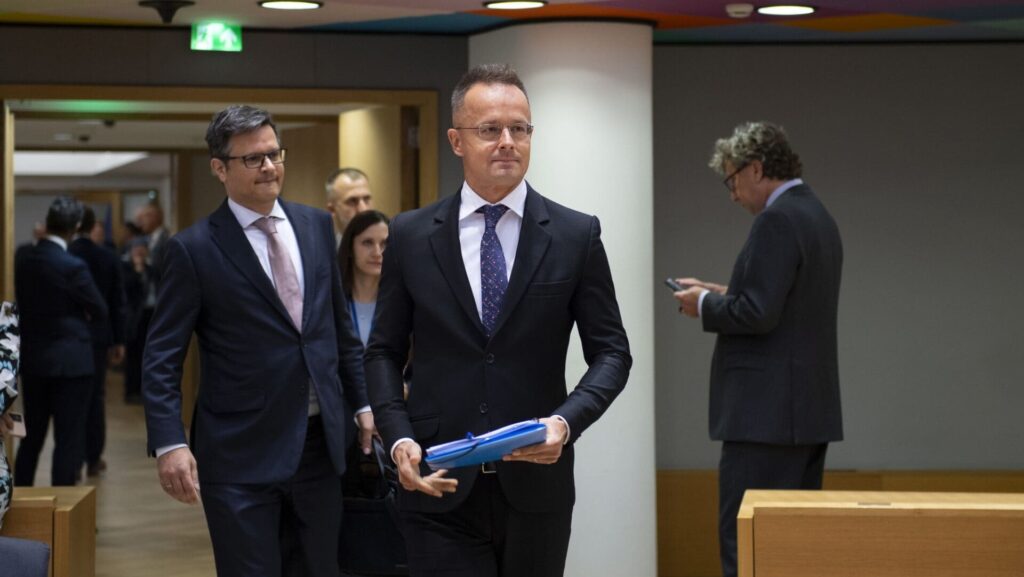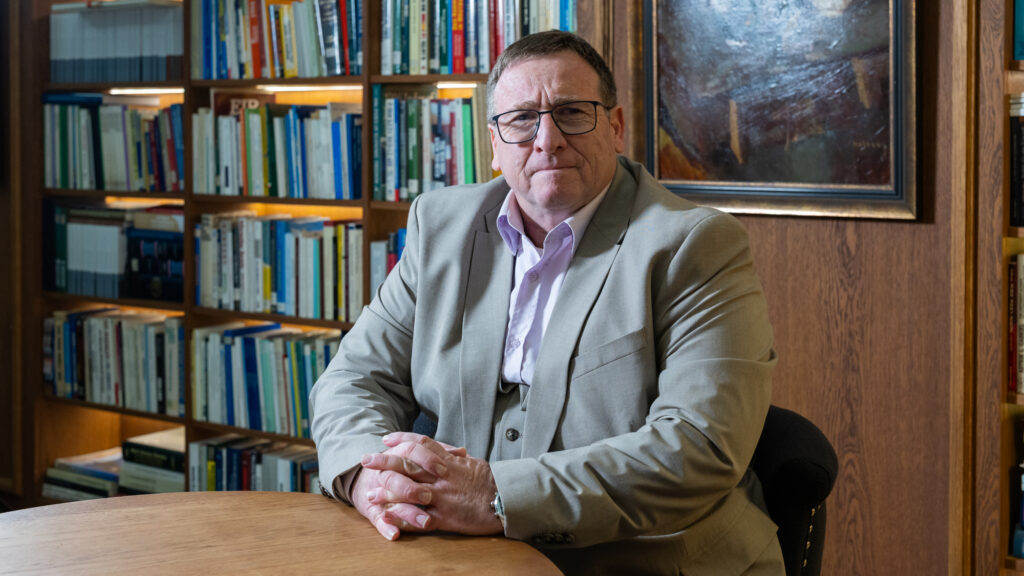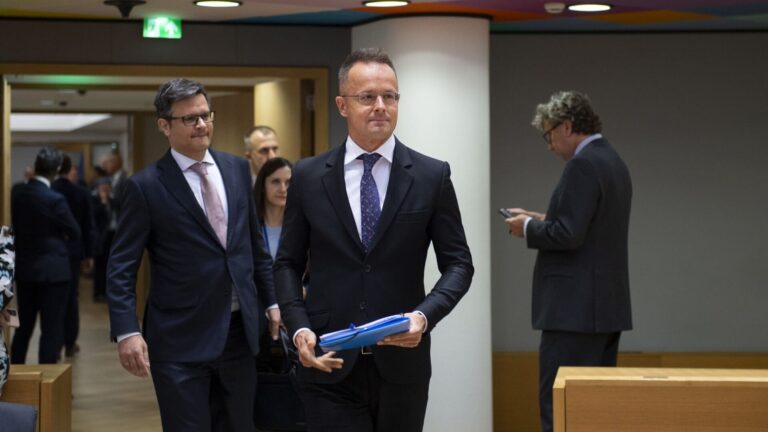MCC Feszt 2025 has just kicked off with a thought-provoking panel discussion featuring Balázs Orbán, political director to the Hungarian Prime Minister; Patrick Deneen, professor at the University of Notre Dame; and James Orr, British academic and philosopher, associate professor at the University of Cambridge. Under the title Beyond Liberalism – Reclaiming Politics for the National Interest, the panellists addressed recent geopolitical challenges and offered their perspectives on the evolving global order.
The discussion first turned to the recently announced US–EU trade deal framework, concluded by European Commission President Ursula von der Leyen and US President Donald Trump on Sunday, 27 July. Professor James Orr recalled earlier expert analyses of Trump’s tariff policy, which had unanimously predicted global economic collapse. ‘Despite that, the US agreed the fastest and one of the best trade deals ever,’ he argued, calling the agreement—heavily criticized by European leaders since its announcement for disproportionately favouring the United States—‘a triumph of national‑conservative economic policy‑making.’
Patrick Deneen observed that, despite media narratives overwhelmingly portraying the agreement as lopsided and a victory for Trump, both parties had nonetheless secured a form of success, as trade and dialogue between the two largest markets in the Western world could continue uninterrupted.
Balázs Orbán opened his remarks by stressing that Donald Trump’s strategy ‘is working very well’. ‘Promoting national interest over ideology works on every level, from geopolitics to trade,’ he emphasized. He then outlined three serious problems facing the European Union.
‘First, Brussels is the most isolated power centre in the world,’ Orbán opined, noting that the EU’s deteriorating relations with both Russia and China were leveraged by Trump’s team during the negotiations. He recalled von der Leyen’s visit to China shortly before the US–EU deal was announced, describing how she sought to secure some symbolic gesture from Beijing to counterbalance Washington, but was not taken seriously and was even humiliated at the reception. ‘It is no coincidence; it is just bad strategy,’ he stressed.
The second problem, according to Orbán, is that the Brussels leadership prioritizes non‑EU countries over its own member states. He cited comments by EU trade chief Maroš Šefčovič regarding a confidential part of the negotiations that concerned support for Ukraine. ‘It is a betrayal of European citizens,’ Orbán stated firmly, arguing that the Commission accepted a deal disadvantageous for the EU in order to strengthen Ukraine’s position against Russia. ‘They should resign immediately,’ he declared.
The third issue, he continued, is directly linked to Brexit. With the United Kingdom’s departure and the weakening of Germany and France, no strong leadership remains within the EU. Bureaucrats have filled the vacuum, pushing a globalist political agenda onto sovereign member states. From migration to the green transition and the war in Ukraine, Brussels has framed crises as justifications for more centralized decision‑making and for siphoning further powers from member states. ‘We should stop the transfer of power to Brussels,’ Orbán concluded.
Turning to the transatlantic relationship, James Orr highlighted how differently the United Kingdom can approach these issues since leaving the EU. Greater sovereignty allows governments to experiment with alternative policies, he argued, a freedom denied to states within the Union. He criticized Keir Starmer’s Labour government for squandering the opportunities of Brexit and aligning ever more closely with Brussels. Regarding US–EU relations under Trump’s second term, he drew an analogy: Washington’s call for European states to finance their own defence and take responsibility for themselves is like a child leaving home to begin an independent life.
Agreeing with this analogy, Patrick Deneen referenced Vice President JD Vance’s iconic Munich speech, arguing that it should not be taken as an insult by Europeans but rather as sound advice. He evoked George Washington’s warning to Americans against excessive entanglement in foreign affairs, urging focus on building the nation’s own economy, identity, and culture. ‘Europe needs its own George Washington,’ he said.

Joining this more anecdotal tone, Balázs Orbán recalled a past conversation with Prime Minister Viktor Orbán, in which the latter reflected that after the Second World War, Europe was occupied by both East and West. When the Cold War ended, the Russians withdrew, but the Americans remained as ‘friendly occupants’. This, he argued, resulted in a complete lack of autonomous strategic thinking among European leaders—clearly reflected in their response to the war in Ukraine, which has followed the lead of Joe Biden’s administration almost exclusively.
On the conflict, James Orr introduced the concept of ‘Ukraine brain’, a psychological mindset that insists the war can only be understood through the lens of the Second World War—casting Vladimir Putin as Adolf Hitler and Volodymyr Zelenskyy as Winston Churchill. As a result, he argued, there is no attempt in the United Kingdom to assess the conflict on its own terms. Orr expressed admiration for Hungary’s approach to the war, praising the government’s strategic vision and diplomatic skill despite the country’s proximity to the front lines.
Building on Orr’s concept, Balázs Orbán argued that liberalism generally divides the world into ‘good guys’ and ‘bad guys’—democrats versus autocrats—in international affairs. ‘If you accept this view, you will feel morally obliged to destroy the “bad” countries. If you do not, you are considered bad yourself,’ he said. Orbán warned that this worldview inevitably leads to world war and must change immediately.
Patrick Deneen delivered criticism of the national‑conservative side, noting that the same ‘good versus evil’ narrative often arises regarding China, with many Republicans portraying the Asian superpower as the great threat to the West. Nonetheless, he welcomed the renewed sense of realism and rejection of ideology in diplomacy.
Concluding the hour‑long discussion, James Orr expressed his admiration for Hungary, calling it ‘a shining City upon a Hill’. He also praised the Hungarian Parliament as ‘the supermodel of all parliaments’. Deneen underlined that Hungary’s history of national tragedies and repeated occupations has given its people a unique awareness of the fragility of their civilization—an awareness largely absent in the broader Western world. He also highlighted Hungary’s internationally recognized family policy and its profound understanding of nationhood. ‘We have much to learn from you,’ he concluded.
Related articles:







